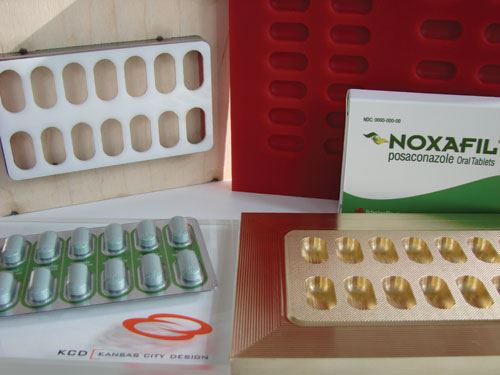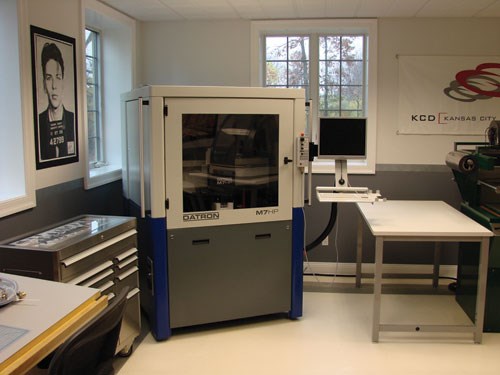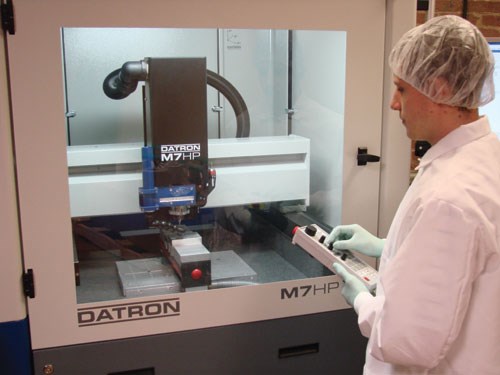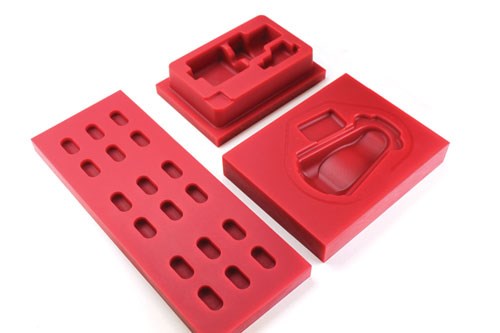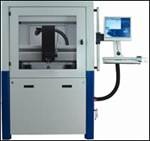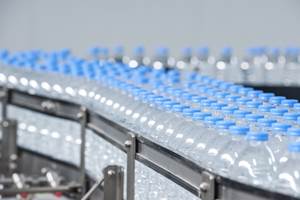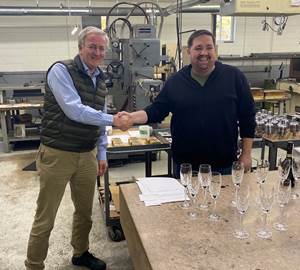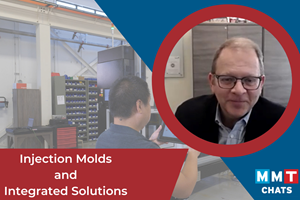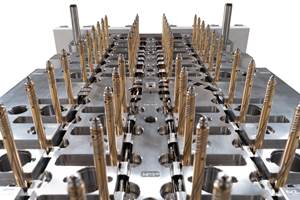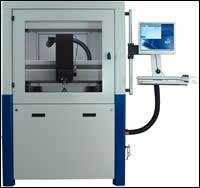Case Study: Machining
High-Speed Machining Center Offers Superior Surface Finish for Aluminum Molds
Kansas City Design (Lambertville, NJ) is not a typical mold shop: it is a one-of-a-kind engineering studio that specializes in prototyping and production tooling. Owner William Arnold began his career doing conceptual work in pharmaceutical packaging, and parlayed this expertise into starting his own company in 1997—specializing in the design, development, engineering and creation of packaging and packaging samples for the pharmaceutical industry. Additional services include CNC-machined molds, tooling used in thermoforming and pharmaceutical packaging equipment, artistic and computer renderings, 2-D and 3-D engineering documentation, graphics, package engineering and prototyping, cold form tooling and samples, child-resistant packaging, and stability test samples for all types of packaging.
When the time came for Arnold to choose a machining center best suited for the wide range of products and services Kansas City Design offers— particularly for pharmaceutical packaging, prototype and production thermoform tooling as well as cold form tooling—he decided upon the Datron M7 high-speed machining center from Datron Dynamics (Milford, NH). According to Arnold, it best fit the company’s needs for a machine with a small footprint that could leave its molds with a high quality finish requiring no handwork.
“We create production quality, first prototype molds and sealers, which yield production-quality samples for all types of testing,” Arnold elaborates. “We will then also create the production tooling if the client requires it. Examples include child-resistant, senior, market, focus groups, clinical trials and accelerated age testing.
“We used to outsource our machine work and just focus on designing and making samples, but we were spending too much money and it was taking too long to get the molds back,” he continues. “I started looking into CNC machines, but the accompanying software was too expensive. One was $14,000 back when I first started checking into it. I also wanted a large work area that would fit up to 20” x 20” blanks and one that offered repeatability and accuracy, with a high frequency spindle that would allow me to use tiny tools down to .001 in diameter.”
A Number of Benefits
Arnold’s research led him to the Datron. “I searched the web whenever I had free time for many weeks to see what was really out there. I did not really find many that weren’t crazy cash,” Arnold says. Datron was great to work with—friendly sales and service people and easy access to financing or leasing. It seemed best suited to our application because it can machine anything from a large mold (of up to 20” x 20”) right down to almost microscopic. It can also drill the vent holes that are required of thermoform tooling. All of our sample molds are cut from Ren 5169, a red-ridged, plastic-type material used for thermoforming plugs, which actually provides better clarity than an aluminum mold when clear plastics are formed on them. Our production molds are aluminum, and this machine excels with aluminum. The plastic—when cooled with alcohol while cutting—comes out even more polished than aluminum. Plus the surface is more slippery, which allows the material to flow more smoothly when vacuumed down to the mold.”
The Datron also leaves a superior surface finish, Arnold notes. “With the incredible accuracy that the Datron provides, it eliminates tool marks typical of 3-D molds that are cut with a step-over.”
Additionally, the speed in both spindle and travel rates of up to 16m/min. and .0005” accuracy allows machining of aluminum to be incredibly fast and precise. “The high-frequency spindle can easily handle cutters down to .001 in diameter, which would actually allow you to drill in the end of a human hair if needed,” he emphasizes. “It gives us the ability to drill tiny vent holes. We usually drill anywhere from .013 to .025—which is required of all thermoformed packaging while still in the machine, as the holes in the mold allow a vacuum to pull the air out of the mold. Other shops do this by hand because their CNCs will not handle a small drill bit like the ones used to vent molds so they have to use a Dremel-style tool to drill the holes.”
The machine’s small footprint of 51” x 51” x 77” also is a great asset. “With conventional milling machines, the table moves around and that is a giant chunk of steel,” Arnold says. “It’s very slow and prone to wear. With this machine the head moves around on precision ball screws entirely, so there aren’t issues like this. It also has a solid, four-inch granite base, which is the most stable substance you can get that is not affected by temperature or stress. Plus, it is a very strong material that can be made incredibly flat. Because of its weight it’s not prone to movement caused by the machine.”
An unexpected benefit is the machine’s ability to be used in a lab, studio or clean room environment. “Although I was looking for machines that had this ability, I had no idea that Ethyl alcohol could be used as a coolant, which would allow it to be in the clean room,” he notes. “Conventional coolants are not allowed in the clean room. With alcohol cooling, the machine sprays a mist of alcohol on the cutter and material, and the parts come out clean and sterile, with no waste fluids. The part can then simply be wiped with a cloth. You are not trying to remove oil and other contaminants that are still in the vent holes, tap holes, etc. The pharmaceutical guys love to see that. I add the information about the machine into my quote to a customer, ‘Precision CNC-machined sample mold cut on the Datron alcohol-cooled machine.’ It’s a great sales tool for us and has actually landed us work.”
Robert Murphy, VP of Datron Dynamics, points out that the combination of a precision high-speed (60,000 RPM) spindle on the M7, powered by a high-frequency generator produces a high-quality surface finish. And there is very little maintenance that needs to be performed on the machines, if any. “Because our systems are designed to use lower-power consumption components, this has a positive effect on the reliability of the equipment and reduces the potential of doing serious damage during operation,” Murphy says. “With a multitude of fail-safes and sensors throughout the machine, it can alarm or stop an operation before any damage is done. Due to our modular machine design, we’ve found that 90 percent of problems can be resolved right over the phone. When a part does need replacement, it can be sent overnight and be installed by the customer—saving downtime and the expense of an on-site service call.”
Another key advantage is the time savings Kansas City Design has realized. What used to take the other shops Kansas City Design outsourced its work to 18 hours to machine now takes an hour or two for the company. “Datron cuts aluminum at high speeds as compared to conventional machines,” Arnold concludes. “Where others dare to walk, the Datron flies!”
For more information:
Kansas City Design / (609) 460-4629
wsa34@comcast.net
Related Content
What is Driving Mold Lifecycle Management Digitalization?
OEMs are looking to partner with suppliers to share and track data across the supply chain for advanced intervention and process management.
Read MoreHammonton Mold, ADOP France Forge Strategic Partnership in Injection Blow Moldmaking
Hammonton Mold Inc., a leading full-service mold shop based in New Jersey specializing in injection blow molds (IBM), proudly announces its official partnership with ADOP France, a prominent IBM mold manufacturer based in Normandy, France.
Read MoreInjection Molds and Integrated Solutions Through Ambition and Innovation
Jordan Robertson, VP, Business Development and Marketing for StackTeck discusses various mold technologies to improve efficiencies in automation, cooling, lightweighting and sustainability.
Read MoreHow to Solve Hot Runner Challenges When Molding with Bioresins
A review of the considerations and adaptations required to design hot runners and implement highly productive injection molding operations.
Read MoreRead Next
How to Achieve Efficiency in Graphite Electrode Milling
A look at the technological advancements of HSM centers that provide the efficiency and quality required for milling graphite electrodes, particularly small electrodes with intricate features and thin-walled characteristics.
Read MoreReasons to Use Fiber Lasers for Mold Cleaning
Fiber lasers offer a simplicity, speed, control and portability, minimizing mold cleaning risks.
Read MoreHow to Use Continuing Education to Remain Competitive in Moldmaking
Continued training helps moldmakers make tooling decisions and properly use the latest cutting tool to efficiently machine high-quality molds.
Read More
